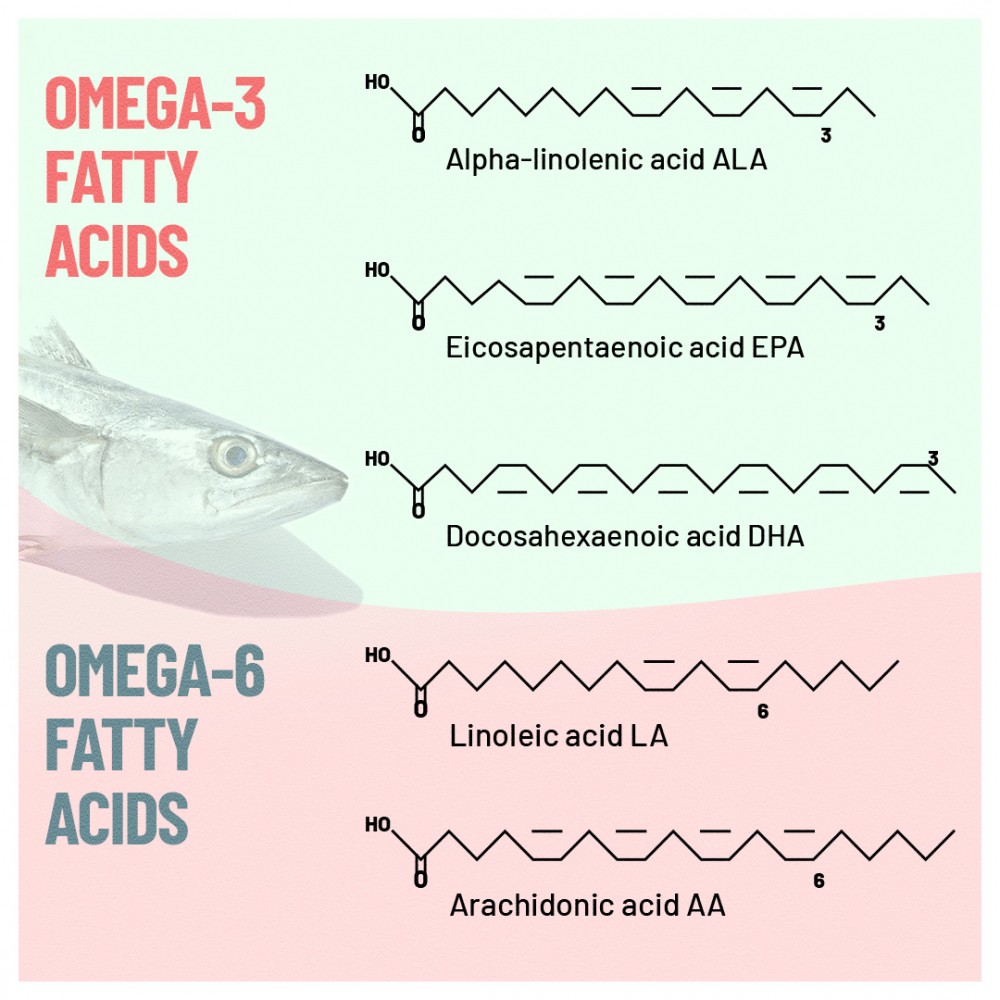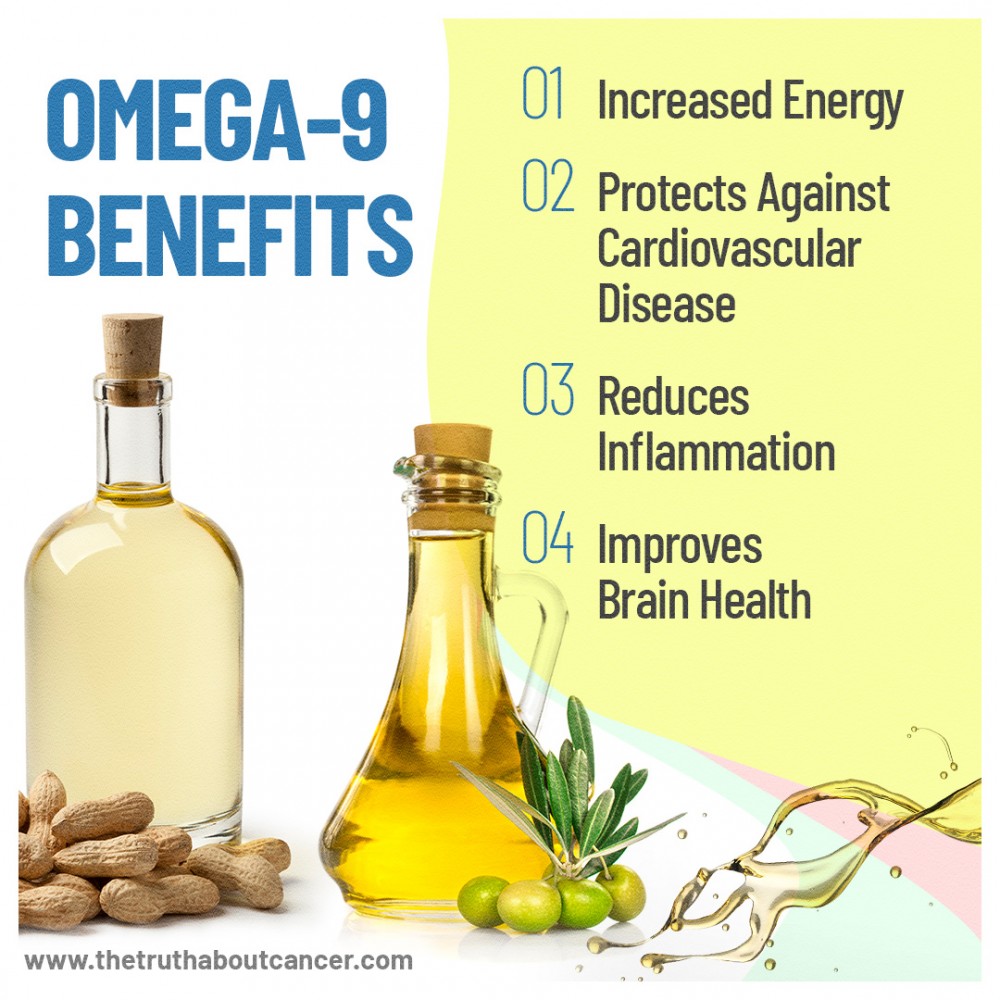Guest Writers for Wake Up World
When it comes to omega fatty acids, it’s helpful to remember your multiplication tables. Or at least your threes. Omega-3, omega-6, and omega-9 fatty acids are all extremely important and offer many benefits. Although omega-3s are the most well-known, it’s important to make sure you get the right balance of each omega for optimal health.
[pro_ad_display_adzone id=”110028″]
These fatty acids can help prevent chronic disease, inflammation, diabetes, dementia, and even cancer! But knowing which fatty acids you need, how many, and where to find them can be tricky. But fear not! We’ve broken it down in a nice, easy list. It’s as easy as 3, 6, 9!
Omega-3s
Omega-3 fatty acids are polyunsaturated fats, which means your body can’t produce them naturally. Omega-3 polyunsaturated fats get their name from their chemical makeup. “Omega” means last, “poly” means many, and “unsaturated” means that they have double bonds. Omega-3s have their final double bond just 3 carbon atoms away from the end of the chain, or the “omega” molecule.
We know: this may seem boring. But it’s important to understanding just how these fatty acids work in the body. We’ll come back to this a bit later. In the meantime, here’s a picture of an omega-3 molecular chain:
 Since we can’t produce omega-3s naturally, it’s essential that we get them through our diet. This is why they are called “essential fats”.
Since we can’t produce omega-3s naturally, it’s essential that we get them through our diet. This is why they are called “essential fats”.
There are several types of omega-3s, but the 3 most common are eicosapentaenoic acid, docosahexaenoic acid, and alpha-linolenic acid. Fortunately, they all have easy acronyms.
EPA (Eicosapentaenoic acid)
EPA is a 20-carbon fatty acid responsible for producing eicosanoids. These chemicals play a huge role in fighting inflammation and have even been shown to improve mental health.1,2 EPA is generally found in oily fish like salmon, mackerel, or sardines. Although it is not produced by the body, it is present in breast milk, and important for infant development.
ALA (Alpha-linolenic acid)
ALA is an 18-carbon fatty acid with special powers; it can be converted into EPA or DHA. The primary role of ALA is to provide us with energy, though it can also prevent cardiovascular disease.3,4 Good sources of ALA include chia seeds, flax seeds, walnuts, hemp, and rapeseed.
DHA (Docosahexaenoic acid)
DHA is a 22-carbon fatty acid that’s critical for a healthy brain. In fact, nearly 8% of your brain is DHA by weight. DHA is especially important for children, since proper brain development depends on it.5 DHA can be found in microalgae and even some plants, although it is most abundant in fish. The higher up the food chain, the more plentiful the supply. DHA from plants actually comes from ALA that has been converted.
Omega-3 Benefits
1 | Fights Inflammation
Chronic inflammation is at the root of almost all chronic disease, including cancer. But the science shows that omega-3s can help regulate inflammatory molecules, keeping inflammation down.
2 | Improves Cardiovascular Health
Omega-3s are important for your cholesterol and can help keep blood pressure down. They can even prevent plaque in the arteries, which is important – cardiovascular disease is the #1 cause of death in the U.S. and is associated with a higher cancer risk.6-8
3 | Improves Mental Health
Depression and anxiety are rampant in Western culture – and on the rise. But omega-3s don’t just prevent them. Omega-3 supplements have actually been shown to reverse depression and anxiety. They can also combat disorders like schizophrenia and bipolar disorder.9-11
4 | Boosts Brain Health
Omega-3s are extremely important when it comes to infant brain development. Even through young adulthood, the brain continues to develop and relies on omega-3s. Not only that, they actually help protect the brain from damage. Studies show that people who eat more fish have slower mental decline and are less likely to suffer from dementia. Omega-3s can even improve memory in older folks.12
5 | Fights Autoimmune Disease
Autoimmune diseases occur when your body attacks healthy cells, mistaking them for malignant cells. Arthritis, lupus, multiple sclerosis, and diabetes are all examples of autoimmune disease. Research shows that getting enough omega-3s early in life can significantly reduce your risk of these diseases.13,14
6 | Prevents Cancer
Improved cardiovascular health is an excellent way to reduce your cancer risk. But omega-3s do more than that. These fatty acids have been shown to reduce the risk of prostate cancer, breast cancer, and colon cancer. For those who consume the most omega-3s, the risk for colon cancer was reduced by over 50%!15,16
The list goes on. Omega-3s are also responsible for promoting bone health, regulating weight, fighting asthma, improving sleep, reducing symptoms of ADHD, and improving eyesight. 17-22 The important thing to remember is that you can only get omega-3s through diet and supplements. The Standard American Diet (SAD) hardly offers any at all, so make sure you incorporate plenty of these essential fatty acids into your diet.

Omega-6 Fatty Acids
Just like omega-3s, omega-6 fatty acids are polyunsaturated fatty acids. But as you may have guessed, the last double bond is six carbon atoms away from the omega, hence “omega-6”. Additionally, like omega-3s, omega-6s cannot be produced by your body, so you need to get them through your diet.
Omega-6 fatty acids are essential for your health, especially for energy.
The most common omega-6 fat is linoleic acid, which can be converted into longer omega-6 fats such as arachidonic acid (ARA). ARA also produces eicosanoids, but they are more pro-inflammatory than those produced by EPA. These pro-inflammatory chemicals are vital for the immune system, but overproduction can lead to chronic inflammation and disease.23
Unlike omega-3s, omega-6s are abundant in the Standard American Diet. It’s estimated that Westerners consume up to ten times the necessary omega-6 fatty acids. They’re still essential, but it’s likely that you will need to decrease your intake rather than increase it.
The most common sources of omega-6 fatty acids are poultry and eggs, grains, leafy greens, and unfortunately, unhealthy oils like vegetable oil or canola oil. Most of our omega-6s come from processed foods. While it’s important to limit your intake of omega-6s, they do offer a number of health benefits.
Omega-6 Benefits
1 | Promotes Inflammation
I know this sounds confusing. But acute, temporary inflammation is extremely important to the body’s healing process. When you cut yourself or sprain an ankle, your body responds with targeted inflammation. This activates the healing process and even protects against infection. Linoleic acid found in omega-6s helps regulate this “good” inflammation.24
2 | Fights Allergies
Though there are few studies on the relationship between omega-6 fatty acids and allergies, they (along with supplements derived from them) have been used for generations as a home remedy. Women with severe allergies are likely to have lower levels of gamma-linolenic acid, or GLA – a product of linoleic acid – in their breast milk and blood.25
3 | Combats Cancer
Some studies have found that GLA can actually increase the effectiveness of other cancer treatments, while others show that GLA inhibits tumor growth and metastasis. Omega-6 fatty acids have also been shown to reduce the symptoms of mastalgia.26,27
4 | Improves Bone Health
Studies show that omega-6s may help to prevent bone loss and osteoporosis. In a study of women over 65 with osteoporosis, those who got extra omega-6 fatty acids experienced less bone loss than the control group.28
The biggest thing to keep in mind is that too many omega-6 fatty acids are a bad thing and can actually contribute to disease.29 They’re essential, so you’ll need to make sure to get some in your diet, but processed foods and grains will likely give you more than you need and make you sick. Most experts recommend a 4:1 ratio of omega-6 fatty acids to omega-3s.
 Omega-9 Fatty Acids
Omega-9 Fatty Acids
Omega-9 fatty acids are different than their cousins in that they are monounsaturated, meaning they only have one double bond. As you may have guessed, it’s located nine carbon atoms away from the omega end of the fatty acid molecule. Oleic acid (which doesn’t have a cool acronym) is the most common omega-9 fatty acid. In fact, it’s the most common monounsaturated fat in your diet.
Also, unlike omega-3s and omega-6s, omega-9s are not essential, since they can be produced by your body. These fats are among the most bountiful in your body. But the fact that they’re not technically essential doesn’t mean you don’t need them in your diet. Omega-9 fatty acids have many health benefits over other types of fat. The best sources of omega-9s are sunflower, avocado, animal fat, and macadamia nuts.
Omega-9 Benefits
1 | Increased Energy
One study found that by increasing monounsaturated fats and decreasing saturated fatty acids, subjects had increased energy and got more physical activity. Increased physical activity can also lead to better sleep, better mood, and better health, so swapping out saturated fats for omega-9s could literally change your life!30
2 | Protects Against Cardiovascular Disease
Omega-9s have been shown to increase HDL cholesterol and decrease LDL cholesterol. This helps regulate blood pressure and reduce arterial plaque buildup. All of these things lower your risk of heart disease and strokes. As we learned earlier, heart disease is a major risk factor for cancer, and the leading cause of death in the United States.31
3 | Reduces Inflammation
A study on mice found that diets high in monounsaturated fats decreased inflammation. In humans, the researchers found that those with diets high in omega-9 fatty acids had less inflammation and better insulin sensitivity then their saturated fat counterparts.32
4 | Improves Brain Health
One type of omega-9 fatty acid is erucic acid, which may benefit dementia patients. Studies have demonstrated that erucic acid can help improve memory and cognitive function in patients with dementia.33
Since omega-9 fatty acids can be produced by the body, they aren’t as important to supplement. But the advantages of omega-9s over saturated fats is tremendous. For better energy, reduced cardiovascular risk, and better brain health, consider introducing more healthy fats, like avocado and sunflower oils.

Omega 3 6 9: A Summary
While each of these fatty acids has a role to play, omega-3s are probably the most important as far as supplementation. The best way to get lots of omega-3s is through fish, though there are many great supplements available.
Omega-6 fatty acids, on the other hand, are already abundant in the Standard American Diet. Since excess omega-6s can be bad for your health, it’s best to eliminate processed foods and excess grains. Don’t worry – you can still get plenty of omega-6s from dark, leafy greens.
Omega-9 fatty acids are not considered essential since the body produces them naturally. But their benefits are excellent, especially when compared with saturated fats. Next time you reach for that bacon and cheese, consider going with something high in omega-9s instead.
A qualified nutritionist can say exactly how much of each fatty acid you need, but if you follow these tips, keep the 3s up, the 6s down, and the 9s around, you’ll be on the road to improved health in no time.
Sources and References:
- 1. Omega-3 Fatty Acids and Inflammatory Processes
- 2. EPA but not DHA appears to be responsible for the efficacy of omega-3 long chain polyunsaturated fatty acid supplementation in depression: evidence from a meta-analysis of randomized controlled trials.
- 3. Update on alpha-linolenic acid.
- 4. Alpha-lipoic acid and cardiovascular disease.
- 5. Dietary omega 3 fatty acids and the developing brain.
- 6. Effect of fish oil versus corn oil supplementation on LDL and HDL subclasses in type 2 diabetic patients.
- 7. Effect of fish oil supplementation on serum triglycerides, LDL cholesterol and LDL subfractions in hypertriglyceridemic adults.
- 8. Effect of omega-3 fatty acids supplementation on endothelial function: a meta-analysis of randomized controlled trials.
- 9. Long-chain omega-3 fatty acids for indicated prevention of psychotic disorders: a randomized, placebo-controlled trial.
- 10. Omega 3 fatty acids in bipolar disorder: a preliminary double-blind, placebo-controlled trial.
- 11. Depression in Parkinson’s disease: a double-blind, randomized, placebo-controlled pilot study of omega-3 fatty-acid supplementation.
- 12. Omega-3 fatty acids and dementia.
- 13. Fatty fish consumption and risk of latent autoimmune diabetes in adults
- 14. Higher intake of omega-3 polyunsaturated fatty acids is associated with a decreased risk of a first clinical diagnosis of central nervous system demyelination: Results from the Ausimmune Study.
- 15. Long-chain (n-3) fatty acid intake and risk of cancers of the breast and the prostate: recent epidemiological studies, biological mechanisms, and directions for future research.
- 16. Dietary fat, fatty acid intakes and colorectal cancer risk in Chinese adults: a case-control study.
- 17. Polyunsaturated fatty acids and their relation with bone and muscle health in adults
- 18. Combining fish-oil supplements with regular aerobic exercise improves body composition and cardiovascular disease risk factors.
- 19. Omega-3 Fatty acids and airway hyperresponsiveness in asthma.
- 20. Fatty acids and sleep in UK children: subjective and pilot objective sleep results from the DOLAB study–a randomized controlled trial.
- 21. Polyunsaturated fatty acids (PUFA) for attention deficit hyperactivity disorder (ADHD) in children and adolescents.
- 22. Circulating omega-3 Fatty acids and neovascular age-related macular degeneration.
- 23. Circulating omega-3 Fatty acids and neovascular age-related macular degeneration.
- 24. Marine omega-3 fatty acids and inflammatory processes: Effects, mechanisms and clinical relevance.
- 25. Omega-6 fatty acids
- 26. Gamma linolenic acid with tamoxifen as primary therapy in breast cancer.
- 27. ibid
- 28. ibid
- 29. The importance of the omega-6/omega-3 fatty acid ratio in cardiovascular disease and other chronic diseases.
- 30. Substituting dietary monounsaturated fat for saturated fat is associated with increased daily physical activity and resting energy expenditure and with changes in mood1,2,3
- 31. Polyunsaturated fatty acids for the primary and secondary prevention of cardiovascular disease
- 32. Monounsaturated fatty acid-enriched high-fat diets impede adipose NLRP3 inflammasome-mediated IL-1? secretion and insulin resistance despite obesity.
- 33. The memory-enhancing effect of erucic acid on scopolamine-induced cognitive impairment in mice.
Originally published at The Truth About Cancer and reproduced here with permission.
About the author:
 Ty Bollinger is a health freedom advocate, cancer researcher, former competitive bodybuilder and author. After losing several family members to cancer, he refused to accept the notion that chemotherapy, radiation, and surgery were the most effective treatments available for cancer patients. He began a quest to learn all he possibly could about alternative cancer treatments and the medical industry. What he uncovered was shocking. There is ample evidence to support the allegation that the “war on cancer” is largely a fraud and that multinational pharmaceutical companies are “running the show.” Ty has now made it his life mission to share the most remarkable discovery he made on his quest: the vast majority of all diseases, including cancer, can be easily prevented and even cured without drugs or surgery.
Ty Bollinger is a health freedom advocate, cancer researcher, former competitive bodybuilder and author. After losing several family members to cancer, he refused to accept the notion that chemotherapy, radiation, and surgery were the most effective treatments available for cancer patients. He began a quest to learn all he possibly could about alternative cancer treatments and the medical industry. What he uncovered was shocking. There is ample evidence to support the allegation that the “war on cancer” is largely a fraud and that multinational pharmaceutical companies are “running the show.” Ty has now made it his life mission to share the most remarkable discovery he made on his quest: the vast majority of all diseases, including cancer, can be easily prevented and even cured without drugs or surgery.
For more information, visit:
[pro_ad_display_adzone id=”110027″]







